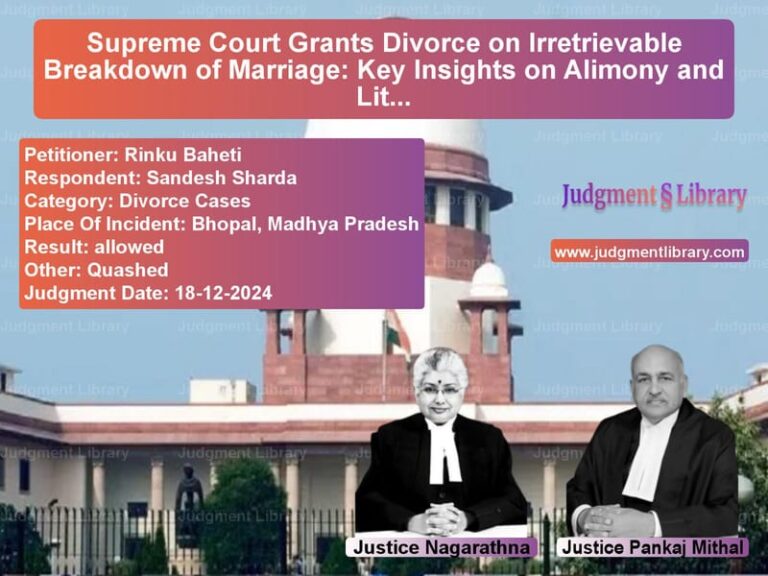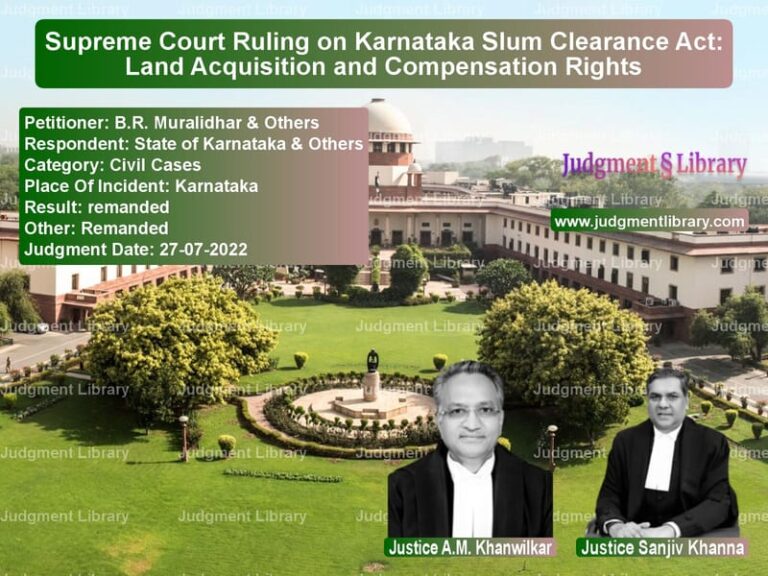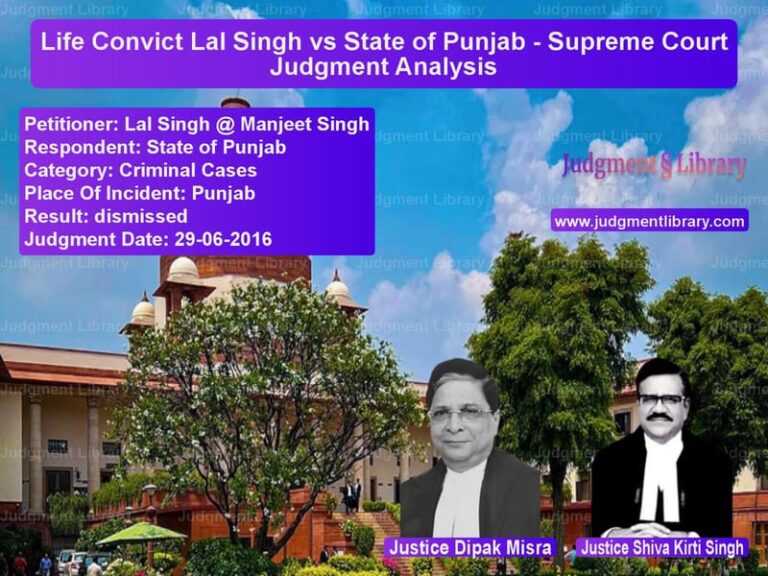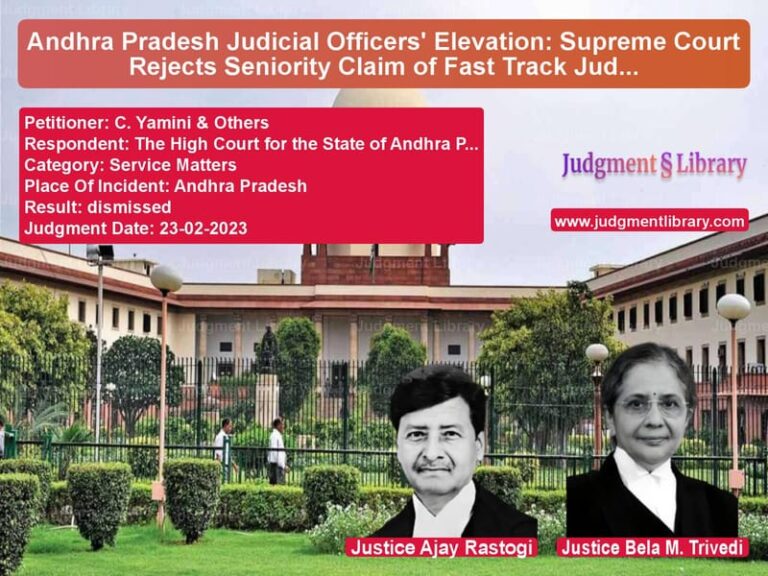Supreme Court Upholds Full Recovery of Study Leave Pay for Premature Retirement
The Supreme Court of India, in its judgment in Wg. Cdr. Ashwini Kumar Handa (Retd.) vs. Union of India & Ors., addressed an important issue regarding the recovery of pay and allowances granted during study leave when an officer takes premature retirement. The ruling upheld the decision of the Armed Forces Tribunal (AFT), confirming that the petitioner was liable to return the entire amount as per the terms of his study leave agreement.
Background of the Case
The petitioner, Wing Commander Ashwini Kumar Handa (Retd.), was serving in the Indian Air Force when he applied for a two-year study leave from December 27, 2003, to December 26, 2005. The study leave was granted with the condition that he would serve the Indian Air Force for nine years after completing his study period. In return, he received his full pay and allowances during the leave.
However, before completing the mandatory nine-year service, the petitioner applied for premature retirement on health grounds. His request was accepted, but the government deducted the entire pay and allowances drawn during his study leave from his post-retirement benefits. The petitioner challenged this deduction before the Armed Forces Tribunal (AFT), which dismissed his plea. He then approached the Supreme Court of India.
Key Legal Issues Considered
- Whether the petitioner was liable to return the full amount received as pay and allowances during his study leave.
- Whether his premature retirement on health grounds exempted him from repayment.
- Whether the deduction should have been made on a pro-rata basis instead of full recovery.
Arguments by the Petitioner (Wg. Cdr. Ashwini Kumar Handa)
- The petitioner argued that he had served for 6 years, 8 months, and 19 days after returning from study leave, which was a substantial portion of the required nine-year period.
- He contended that since he was granted premature retirement on medical grounds, the condition of full repayment should not be enforced.
- He claimed that the government’s action amounted to unjust enrichment, as they benefited from his service for almost seven years.
- He cited similar cases where the government had only deducted the proportionate amount instead of full recovery.
Arguments by the Respondents (Union of India & Ors.)
- The respondents contended that the petitioner had signed a Service Guarantee Certificate agreeing to serve for nine years or return the full pay and allowances if he left early.
- They argued that his retirement was not solely due to medical reasons but also because of personal dissatisfaction over promotion delays.
- They emphasized that the Service Guarantee Certificate did not allow for proportionate deduction, and the full amount had to be recovered if the officer failed to complete the required service.
Supreme Court’s Observations
The Supreme Court analyzed the terms of the study leave agreement and the grounds for the petitioner’s premature retirement. The Court observed:
“The undertaking given by the petitioner in the Service Guarantee Certificate was clear and binding. The appellant had agreed to serve for nine years after returning from study leave, failing which the entire amount paid during the leave period was recoverable.”
The Court also examined the nature of the petitioner’s retirement and noted:
“The main reason cited for premature retirement was dissatisfaction over delay in promotion and refusal of posting requests, rather than health issues. Hence, the argument that medical grounds should exempt him from full repayment does not hold.”
Final Judgment and Directions
- The Supreme Court dismissed the appeal, upholding the judgment of the Armed Forces Tribunal (AFT).
- The Court confirmed that the petitioner was liable to return the full amount of pay and allowances received during his study leave.
- It rejected the argument for pro-rata deduction, emphasizing that the agreement was clear and binding.
- The Court also declined to entertain the argument of discrimination based on other similar cases, citing a lack of evidence.
Implications of the Judgment
This ruling has significant implications for military personnel and government employees availing study leave:
- Strict Enforcement of Service Bonds: Employees who sign service bonds must fulfill their obligations or face full recovery of benefits.
- Medical Grounds Must Be Sole Reason for Exemption: If an officer cites medical grounds for premature retirement, it must be the primary reason and not an additional factor.
- No Automatic Pro-Rata Deduction: Unless explicitly mentioned in the agreement, courts will not grant proportionate deductions for partial service.
- Government Can Recover Pay and Allowances: The ruling reaffirms that study leave benefits are conditional and must be returned if obligations are not met.
Conclusion
The Supreme Court’s decision in this case reinforces the principle that service agreements must be honored as per their terms. By upholding full recovery of study leave pay, the ruling sends a clear message that employees cannot avoid contractual obligations unless specifically exempted under the law. This decision sets a strong precedent for similar cases in the future.
Don’t miss out on the full details! Download the complete judgment in PDF format below and gain valuable insights instantly!
Petitioner Name: Wg. Cdr. Ashwini Kumar Handa (Retd.)Respondent Name: Union of India & Ors.Judgment By: Justice A.K. Sikri, Justice Ashok BhushanJudgment Date: 01-02-2018
Download Judgment: Wg. Cdr. Ashwini Kum vs Union of India & Ors Supreme Court of India Judgment Dated 01-02-2018.pdf
Direct Downlaod Judgment: Direct downlaod this Judgment
See all petitions in Employment Disputes
See all petitions in Public Sector Employees
See all petitions in Termination Cases
See all petitions in Judgment by A.K. Sikri
See all petitions in Judgment by Ashok Bhushan
See all petitions in dismissed
See all petitions in Quashed
See all petitions in supreme court of India judgments February 2018
See all petitions in 2018 judgments
See all posts in Service Matters Category
See all allowed petitions in Service Matters Category
See all Dismissed petitions in Service Matters Category
See all partially allowed petitions in Service Matters Category







